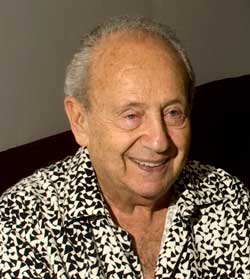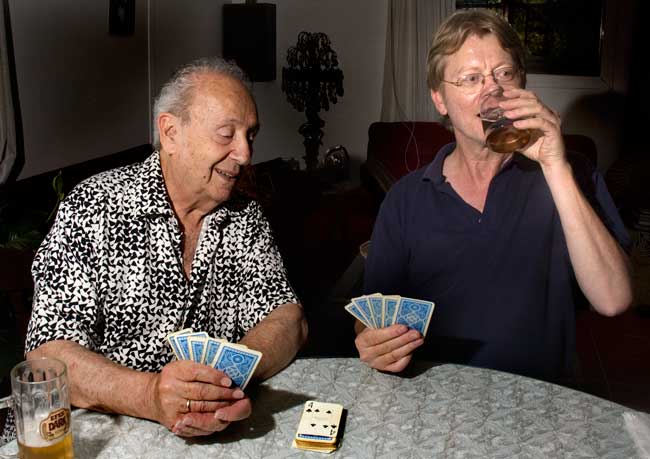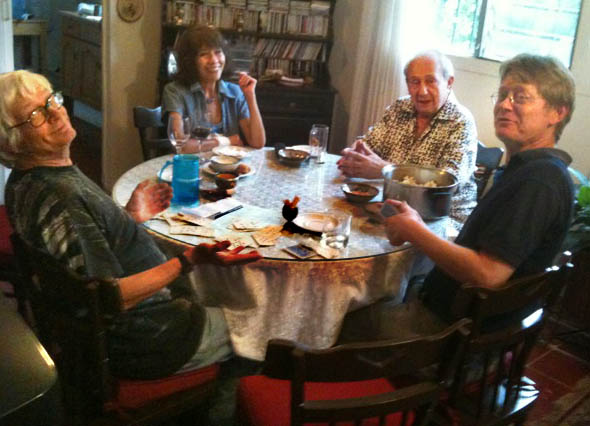 July
10, 2010
July
10, 2010
The Jalisco Philharmonic Orchestra is presently in the middle of a seven-week
tour de force during which they are playing all the symphonies of Ludwig van
Beethoven in Guadalajara’s Teatro Degollado. Apparently this program is
extremely popular because tickets have been selling fast.
Last weekend, the orchestra’s guest conductor was Maestro Anshel Brusilow, who,
for many years, was concertmaster of the Philadelphia Orchestra under the
direction of the renowned conductor Eugene Ormandy. Brusilow is said to be one
of the best directors of Beethoven’s work, but after a full week of rehearsals,
he turned to first violist Robert Nelson.
“Enough Beethoven,” he said. “Do you know anyone who plays Bridge?”
Nelson did not, but invited the maestro to join him for a game of Oh Hell with
friends John and Susy Pint in rustic Pinar de la Venta, located on the edge of
the Primavera Forest, just west of Guadalajara.
Oh Hell is a game said to have been invented by author and cryptographer
Geoffrey Mott-Smith in the 1930s. The game got its curious name from the
exclamations of players who failed to accurately predict the number of tricks
they would win. “If you accidentally win, you end up losing,” says an
aficionado. Originally, the game was called Oh Pshaw, reflecting the mores of
the time. According to Wikipedia, the game has acquired 94 other names over the
years, including Oh Shoot, Aw Shucks, Oh Heck, Rage, Rats and Greasy Biscuits,
not to mention a great many other epithets unfit to print in a newspaper as
genteel as this one. It is, by the way, said to be a favorite game of former
U.S. President Bill Clinton.
|
How to Win at Oh Hell: Maestro Anshel Brusilow (left) demonstrates
his technique while violist Robert Nelson is distracted by the exquisite
taste of Guadalajara's Minerva beer.
Photo by John Pint
|
 |
So what do musicians talk about when they sit down to play cards? Music, of
course! And, about to celebrate his 82nd birthday next month, Brusilow had a
wealth of stories to share with his fellow card players.
Brusilow began his career by studying violin at the age of five and was already
conducting at 16. By the time he joined the Philadelphia Orchestra in 1959, his
fame was such that Ormandy simply told him, “You’re the best – however you want
to play, play it.”
Not everyone was as accommodating as Ormandy. In 1961, Brusilow was playing
Shostakovich’s “First Symphony” and the composer was present on stage. He played
the piece with all his heart and soul, deeply and romantically. However, Tikhon
Khrennikov, a member of the Central Committee of the Communist Party, was also
present, representing the interests of the Kremlin. “Apparently,” said Brusilow,
“Khrennikov thought the way I played had ‘too much warmth’ and was ‘too
bourgeois.’”
Ormandy walked up to Brusilow and whispered, “Shostakovich says, ‘Could you play
faster?’”
“No, I like it this way,” Brusilow replied.
Ormandy announced that Brusilow would play the piece again, but shook his head
and under his breath said, “They’re not going to like it.”
Brusilow played it again, but only slightly faster and this time. Shostakovich
didn’t say a word. “And that’s how it got recorded,” said Brusilow with a warm
smile.
After several more hands of Oh Hell, along with several exquisite local Minerva
beers, Brusilow recalled a meeting with another famous composer, Igor Stravinsky.
“I think it was 1961 when Stravinsky was going to conduct his own program in Ann
Arbor, Michigan. We had been rehearsing in the hall and had a break. Now, I had
the score of his Sacre du Printemps with me, which I was going to conduct
that summer with Philadelphia, and I wanted to get his autograph on it. So I
went to his dressing room and just then he came out. ‘Could I talk to you a
bit?’ I asked. He replied, ‘Yes, let’s go someplace where we can sit and talk.’”
Continued Brusilow: “I said, delighted, ‘I know a really nice place. Let me get
two chairs.’ And we talked and he signed the score. But then he said, ‘You know
something, all conductors are guilty of fraud.’ I said, ‘What do you mean?’ He
replied, ‘You know I write my music the way it is. I have a bar with four beats,
with three beats, with eight beats, but they ignore this. It’s not what I wrote,
it has nothing to do with what I wrote – and it’s wrong.’ So I said, ‘You know,
I’m going to make you a promise. Whenever I conduct anything you wrote, I’ll
never change one bar.’ He said, ‘Well, thank you. I appreciate it.’ And then he
talked a little about his life in Russia. He was a very charming man.”
Like all good storytellers, Brusilow wasn’t finished with his Stravinsky tale.
“It was getting close to go back and rehearse some more, but suddenly his wife
came up. She leaned over and whispered something into his ear. And he said,
‘Alright, alright.’ Then, when she was gone, he looked at me. ‘You see, when you
get old, they have to come to tell you when to go to the toilet!’”
Later that evening, after Brusilow returned to his hotel, Nelson commented, “In
the mid-1970s I bought a two LP set of Italian composer Ottorino Respighi’s
music, recorded by the Philadelphia Orchestra under Eugene Ormandy and I
absolutely loved the recordings, especially the violin solos. So when I met
Brusilow last week, I asked him if he was the one who played those solos.
‘Yeah,’ he replied, ‘that would be me.’ Never in my life did I imagine I would
someday be playing cards with the man who made that music which I so admired all
those many years ago.”
If you’d like to see Brusilow in action, it’s too late this year in Guadalajara,
but you can catch up with him in Richardson, Texas, where he conducts the
Richardson Symphony Orchestra. As for Bob Nelson, you can hear him playing
Beethoven on the following two weekends, if of course, the theater isn’t sold
out. If that leaves you high and dry, you can always go to
www.pagat.com and download the rules for Oh
Hell.

"So how did he win the final hand if he's just a
novice?"
(Note look of total innocence on the
Maestro's face)
John & Susy Pint, Anshel Brusilow and
Bob Nelson at mile-high Rancho Pint
Photo by Joel Vandroogenbroeck
HOME
 July
10, 2010
July
10, 2010 July
10, 2010
July
10, 2010